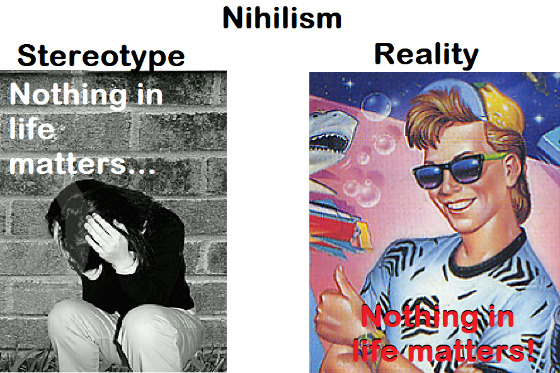
Some people claim that you can live a joyful, productive, maybe even a meaningful life as a nihilist. Nihilism, they say, is OK. Better than OK! It’s fun and freeing and fulfilling!
Mostly, they seem unclear on the concept. They do not, in fact, advocate nihilism, as the denial of all meanings.1 Rather, they reject eternalism—the fixation of all meanings—and rightly so. Although this misunderstanding causes needless confusion, it can be a helpful step.
You can indeed lead a joyful, productive life after rejecting eternalism; but not as a nihilist. Nihilism makes you miserable and ineffective. That is not OK. It also erodes our cultures’ and societies’ ability to improve conditions and tackle urgent problems. That is also not OK.
What is happy nihilism?
“Happy nihilists” generally advocate some stance that is neither eternalism nor nihilism in the usual sense. Often, they suggest the subjective choice of one’s own meanings, which is existentialism, not nihilism. Unfortunately, existentialism is difficult to maintain, because mostly we can’t choose meanings. Some meanings are nearly impossible to either alter or overlook, and so are some meaninglessnesses. Therefore, when happy nihilism means existentialism, it usually eventually collapses back into either eternalism or unhappy nihilism. Clearly distinguishing existentialism (which is moderately bad) from nihilism (which is worse) can help you avoid that collapse.
In some cases, self-described nihilists may have found a stance that is not eternalist, nor existentialist, and also does not deny meanings. That is the complete stance, which Meaningness also advocates.
Like existentialism, the complete stance is difficult to maintain consistently. Happy nihilists may find helpful strategies and tactics for that later in the book. I would also suggest that “nihilism,” because of its negative connotations, may not describe your stance well for others. A positive alternative would be more effective for communicating and advocating your discovery.2
Does nihilism matter?
Some, rather gloomier, nihilists insist that nothing means anything, and although that’s kind of a drag, it doesn’t really matter.
Maybe nothing much would be different if everyone believed nothing matters. We can’t be sure whether that’s true from abstract reasoning; it’s a factual question.3 I don’t know of careful studies, but I observe that people get unhappy, unpleasant, and unproductive when feeling nihilistic.
Nihilism includes moral nihilism, the claim that there are no morally good or bad actions. If people believed and acted on that, we’d have the nihilist apocalypse. Many people do say they believe this, but they act about as morally as others, so maybe the belief doesn’t matter? More likely, they don’t believe it in the way they say they do. Maybe they mean “ethics has no ultimate grounding, so nothing is really right or wrong, but of course we feel compassion and care about justice, and usually act accordingly.” I’ve heard many self-described “nihilists” say things like this. That’s not nihilism, it’s a rejection of ethical absolutism. It’s on the way to the complete stance for ethics.
Banal cultural nihilism
For most of the twentieth century, nihilism was considered a major threat. Over the last few decades, that worry has faded. There’s now a mistaken impression that nihilism is an old-fashioned, dead issue. That’s based on the accurate assessment that no one now takes it seriously as a philosophical problem, and the nihilist apocalypse has not happened.
But rather than coming as a sudden, sharp shock, nihilism has metastasized as a dull, debilitating disease. Lite nihilism is everywhere, as a de facto aspect of mass culture and politics.
“Pop pomo” is partly to blame.4 Postmodernism and poststructuralism rose from the ashes of existentialism, historically. Where existentialism said meaning must be an arbitrary individual choice, pomo makes it an arbitrary social choice. When social groups make different choices, there is no basis for negotiation, because both are equally arbitrary. Then all conflicts reduce to raw power struggles.
This “banal nihilism” is the ideological basis for much current populist authoritarianism.5 These movements are simultaneously dogmatically eternalistic and chaotically nihilistic. The tribal “values” are absolute, and must not be questioned or disrespected; but truth, morality, and justice have no meaning beyond what we want this week.
After postmodern nihilism
Meaningness and Time analyzes current social, cultural, and political developments, and advocates a better future that draws on an understanding of the simultaneous nebulosity and pattern of meaning. That is: the complete stance.
- 1.No one owns definitions, and there are other, technical uses of “nihilism.” However, “nothing means anything” is what is typically meant in common usage. (Philosophers call this “existential nihilism,” when it’s necessary to distinguish it from other sorts.) In any case, “happy nihilists” often explicitly say “nothing means anything, and that is just great!”
- 2.A nice example of happy nihilism is Charlie Huenemann’s “Everything is meaningless – but that’s okay” (Three Quarks Daily, October 26th, 2015). He insists that everything is meaningless because there is no eternal meaning, but then defines “value” to mean the sorts of meaning that aren’t eternal, and says they are all we need. Substantively, this is more-or-less the complete stance, but it seems an unhelpful way of explaining it.
- 3.Guy Kahane’s “If nothing matters” is quite good if you want an abstract philosophical treatment. Noûs 51 (2):327–353 (2017).
- 4.John Nerst’s “Postmodernism vs. The Pomoid Cluster” (Aero Magazine, 30 June 2018) analyzes the relationship between postmodernism as an academic theory and “pomo” as a popular way of relating to meaningness.
- 5.Karen Carr’s The Banalization of Nihilism (1992) coined the term and analyzed the problem.
